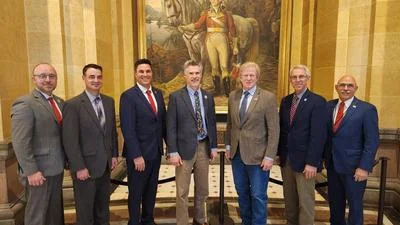Imagine a classroom full of bright, inquisitive college students who have no idea who Pontius Pilate was or have never heard the story of Noah’s Ark.
That’s what Gwen Jordan, an associate professor of legal studies at the University of Illinois-Springfield, has experienced.
More than 10 years ago, she was a graduate student teaching a U.S. history course at the University of Illinois- Chicago, and she was stunned to discover that none of her students knew the biblical reference to Ben Franklin’s “olive branch petition.” (A dove bearing an olive branch returned to Noah’s Ark and it has become a symbol of peace.) Franklin’s olive branch petition was a plea from colonists to avoid war with Great Britain.
In a class Jordan is teaching at UIS, she discovered that none of her students in the law and society class knew who Pontius Pilate was. (In case you need a reminder, he was a really bad governor – almost as bad as Rod Blagojevich and Bruce Rauner.)
Jordan was teaching from Rosco Pound’s tome “What is Law” where Pound ponders: “What is Truth.” That of course was the question Pilate asked Jesus Christ shortly before he ordered his crucifixion.
In case you think Jordan is a religious zealot, think again. She grew up Presbyterian in Peoria, later dabbled at being a Unitarian and now just calls herself “spiritual.”
What she is experiencing in the classroom is what my college civil liberties professor, Donald Boles, warned of more than 30 years ago. Boles was one of the foremost experts on the intersection of religion and public schools.
He agreed with the 1963 Supreme Court decision, Abington Township v. Schempp, which prohibited mandatory recitation of Bible verses in public schools. But he feared that school administrators (modern day scribes and Pharisees) would use the ruling as a legal pretext to eliminate classes dealing with religion.
But the high court said just the opposite in their landmark ruling:
"In addition, it might well be said that one’s education is not complete without a study of comparative religion or the history of religion and its relationship to the advancement of civilization. It certainly may be said that the Bible is worthy of study for its literary and historic qualities. Nothing we have said here indicates that such study of the Bible or of religion, when presented objectively as part of a secular program of education, may not be effected consistently with the First Amendment.”
Sadly, Professor Boles was prophetic. Schools have cut back on the religion courses over the past half century. And it has resulted in a growing ignorance of even the most basic Biblical references.
This has had a corrosive effect on our society.
Common touchstones are disappearing that once bridged the language gap between those active in a church or synagogue and those who are not.
Abraham Lincoln was keenly aware of the shared cultural reference the Bible represented when he quoted the Gospel of Mathew in the period leading up to the Civil War by saying “A house divided against itself cannot stand.”
Could an American leader use such a Biblical reference today and be understood by all?
Probably not. We are losing the common reference point the Bible has brought our culture.
It seems we too are becoming a house divided.
– Scott Reeder is a veteran statehouse journalist. He works as a freelance reporter in the Springfield area and produces the podcast Suspect Convictions.





 Alerts Sign-up
Alerts Sign-up